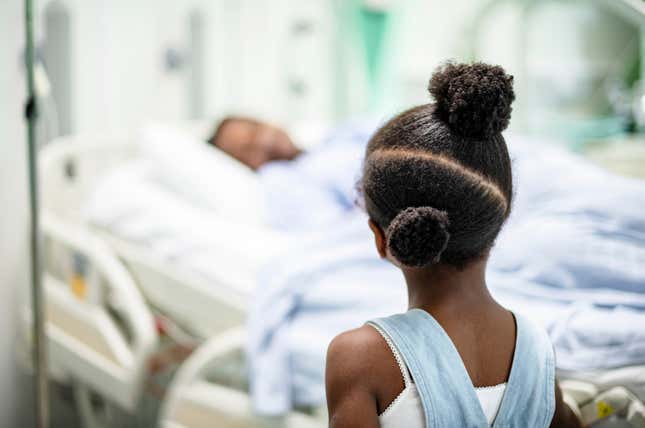
About a year ago I made up my mind to never give birth to a child in the United States. The decision came after I stumbled into an urgent care clinic in the Chicago neighborhood I lived in, after hours of lying on the couch in my apartment feeling weak and severely dehydrated yet unable to keep down even sips of water.
My body started trembling uncontrollably while I was on the phone with my grandmother in Jamaica who was prescribing me a home remedy, and she was worried enough about the trembling to tell me to take myself to a doctor even though she doesn’t think they know all that much.
When I walked into the clinic, the nurse who manned the reception desk was talking compassionately to a white couple trying to get vaccination records fast-tracked. My memory is fuzzy and I was bent over the check-in desk trying not to faint at the time, but I don’t remember it sounding like they needed the records for an emergency. Still, the nurse talked to them at length about how he could help them out—giving them tips and telling them to come back soon—before he waited to acknowledge me.
After the couple left the nurse asked me brusquely what I needed. When I told him I couldn’t keep any water down he said that I was probably fine and just needed to drink some Pedialyte. Then I made the mistake of asking how soon I would be able to see a doctor. For some reason, that made him enraged. He yelled at me to get out of the clinic and shouted that I was probably a drunk or a druggie.
Outside on the sidewalk, as I shakily dialed up an Uber to take me back home, I remember thinking to myself, what if I was dying? What if I was having a baby?
I’ve read about maternal mortality in the U.S., how black women here lose their lives at nearly 3 times the rate white women do in childbirth, how even Serena Williams almost died from blood clots after giving birth to her daughter Olympia because the people taking care of her in the hospital didn’t listen when she told them she needed a CT scan. But the onset of the deadly COVID-19 infection has shown that black women can be dismissed and suffer fatal consequences even outside of maternity experiences.
That was the case for Rana Zoe Mungin, a 30-year-old black woman and Brooklyn resident who recently died from coronavirus complications, and who ironically wrote about institutional racism while a Master’s student at the University of Massachusetts, according to the Boston Globe.
Mungin sought out treatment multiple times in the weeks before her death. After experiencing a fever, cough, and shortness of breath for nearly a week she went to an urgent care clinic for help. Though she was worried she had COVID-19, they treated her for an asthma attack.
Mungin’s condition worsened, and because she was too weak to take the subway to the nearest hospital, she called 911. When the ambulance arrived, the EMTs were convinced it was a panic attack, not COVID-19. One of them sat with Mungin, who is Black, asking her questions to help her calm down. When he asked her about her long-term dreams and goals, she replied through labored breath, “My goal is not to die today.”
The EMTs left her to head to their next call. Still determined to get help, Mungin found her own way to the emergency room at Brookdale Hospital. There, she was placed in an area with people who had tested positive for COVID-19 but was not tested herself. Doctors said her lungs sounded clear. Terrified she would contract the virus if she hadn’t already, she went home.
“My goal is not to die today,” Mungin said.
By April 27 she was dead.
A similar story came out recently from Michigan, where a 63-year-old black woman died from COVID-19 after being turned away four different times from the hospital where she had worked for 31 years.
How many more lives will be lost because black women’s symptoms, voices, and pain are not taken seriously?
Though I find my grandmother’s stubborn distrust of Western medicine equal parts funny and scary, sometimes I can’t blame her for putting her trust in home remedies. Some things, like seeking out help you know you need to live— only to be turned away, are infinitely scarier.

